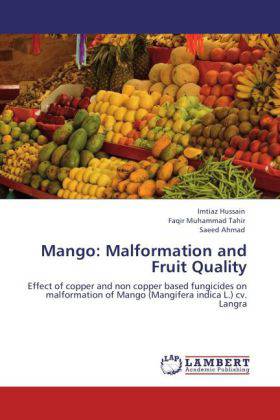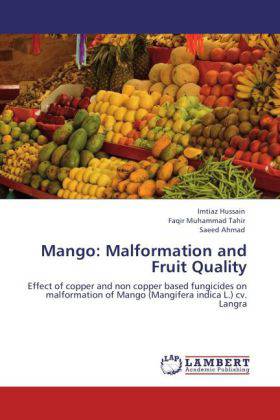
- Afhalen na 1 uur in een winkel met voorraad
- Gratis thuislevering in België vanaf € 30
- Ruim aanbod met 7 miljoen producten
- Afhalen na 1 uur in een winkel met voorraad
- Gratis thuislevering in België vanaf € 30
- Ruim aanbod met 7 miljoen producten
Zoeken
Mango
Malformation and Fruit Quality
Imtiaz Hussain, Faqir Muhammad Tahir, Saeed Ahmad
Paperback | Engels
€ 58,45
+ 116 punten
Omschrijving
The main purpose of writing this book is providing the maximum information to the mango growers about management strategies to overcome the mango malformation and improve the fruit quality. Because, mango (Mangifera indica L.) is known as "king of fruits" due to its delicious taste and excellent flavour. Unfortunately, it is subjected to a large number of disorders right from the plants in the nursery to the fruit in transit and storage, which ultimately results a low yield with poor fruit quality. Of these, mango malformation is most damaging and so far untraceable and uncontrollable. To achieve the goal of high production, the improvement of mango production practices is needed which should eliminate or minimize the potential obstacles in successful mango culture i.e. malformation. Various control measures have been suggested but none of these have been proved satisfactory because of the complex nature of this malady. Therefore the present work was initiated to ascertain the effectiveness of copper and non copper based fungicides as foliar sprays in minimizing the intensity of malformation of mango.
Specificaties
Betrokkenen
- Auteur(s):
- Uitgeverij:
Inhoud
- Aantal bladzijden:
- 128
- Taal:
- Engels
Eigenschappen
- Productcode (EAN):
- 9783848400157
- Verschijningsdatum:
- 7/02/2012
- Uitvoering:
- Paperback
- Formaat:
- Trade paperback (VS)
- Afmetingen:
- 152 mm x 229 mm
- Gewicht:
- 199 g

Alleen bij Standaard Boekhandel
+ 116 punten op je klantenkaart van Standaard Boekhandel
Beoordelingen
We publiceren alleen reviews die voldoen aan de voorwaarden voor reviews. Bekijk onze voorwaarden voor reviews.











